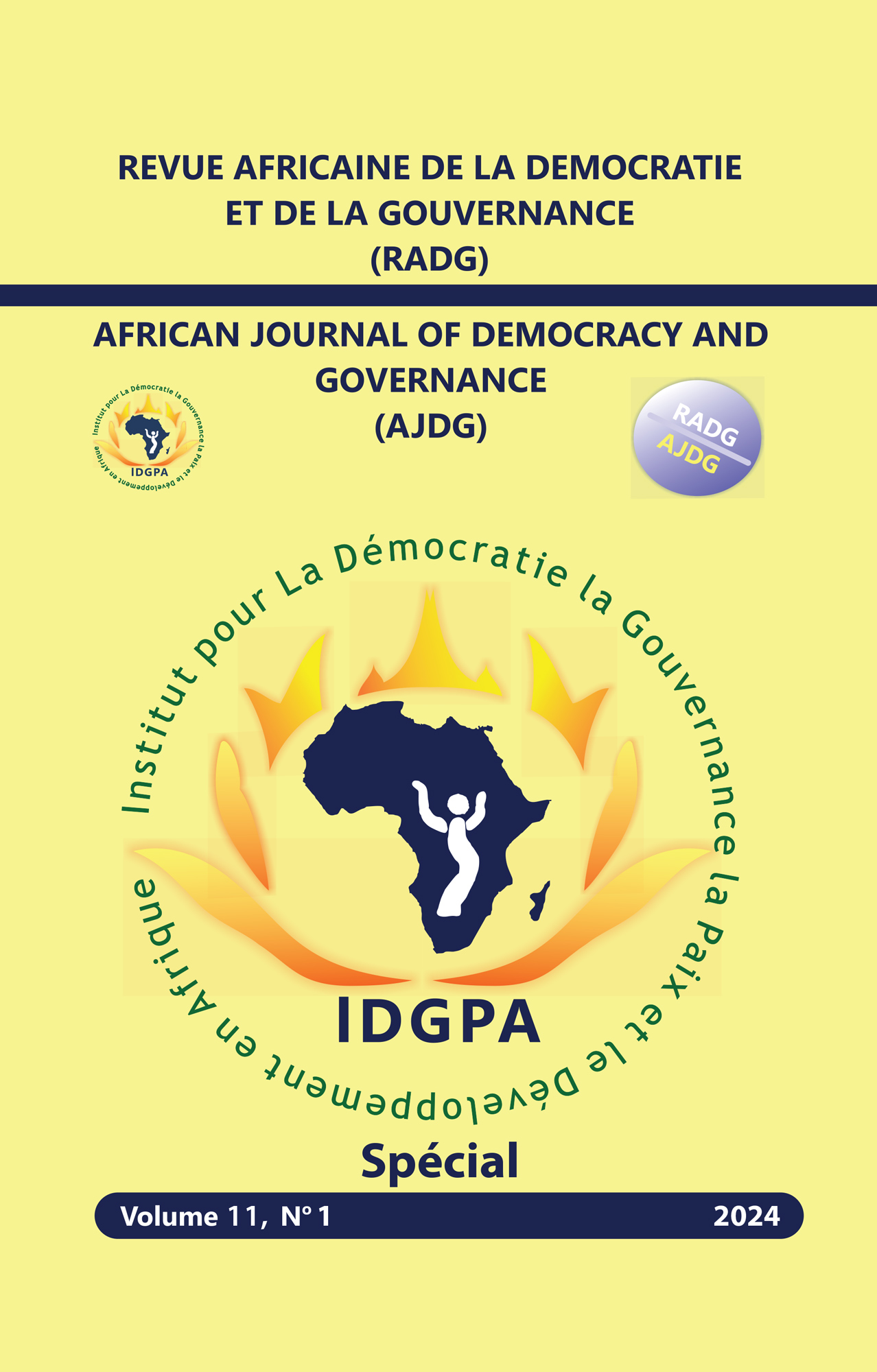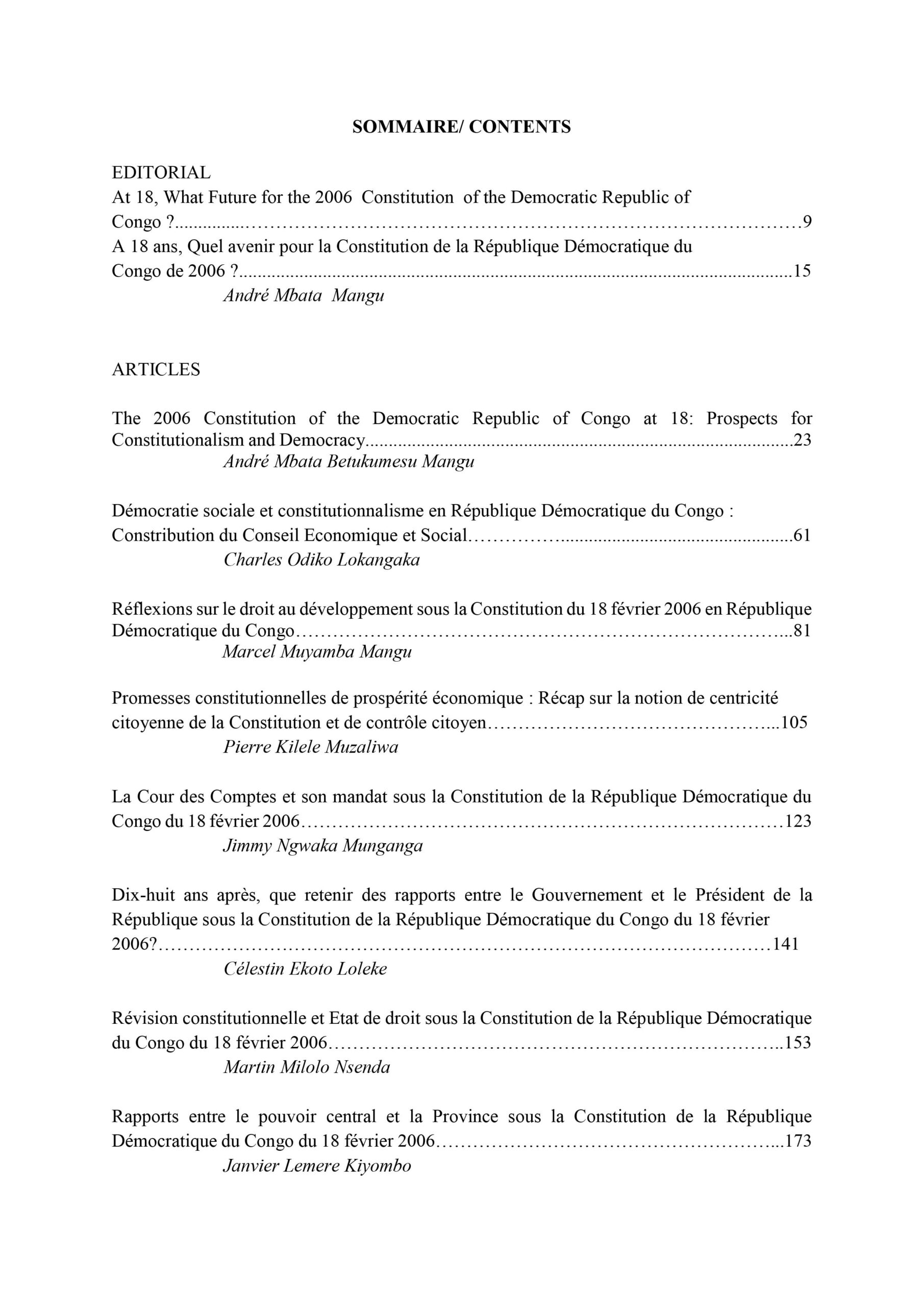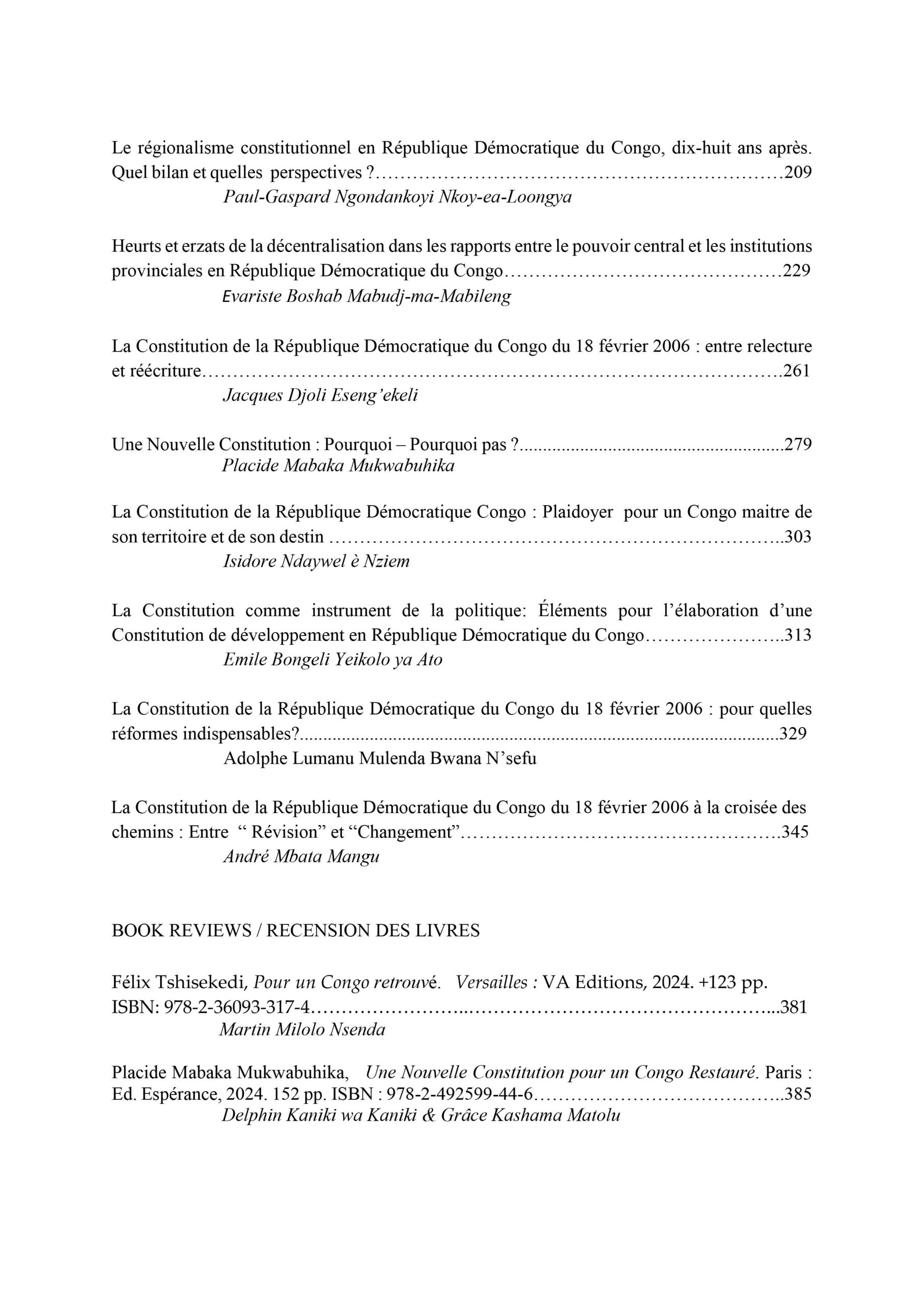La Constitution de la République Démocratique du Congo du 18 Février 2006 : pour quelles réformes indispensables?
$ 10,00
Adolphe Lumanu Mulenda Bwana N’sefu, Professeur Ordinaire à la Faculté des Sciences sociales, politiques et administratives de l’Université de Kinshasa, République Démocratique du Congo
Abstract
Eighteen years after the Constitution of 18 February 2006 came into force in the Democratic Republic of Congo, its persisting institutional dysfunctioning seems to have led to a large consensus around the idea and the necessity of the rereading or rewriting of this Constitution and the electoral law. The scope of legal and constitutional reforms is very wide. It is therefore worth identifying the possible scenarios and options as well as the constitutional provisions likely to be revisited. These are, inter alia the provisions related to the modalities of voting, to presidential, national legislative, provincial, senatorial, municipal, urban, and local elections, to the organisation of the state, political regionalism, citizenship and the permanently entrenched constitutional provisions. Moreover, it is necessary to define the political and legal procedure that needs to be followed. As for the organ of reforms, drawing from the Congolese and foreign experiences, this article suggests the creation of a consultative committee in charge of institutional reforms taking into consideration Congolese and foreign experiences. Finally, to inspire the reforms, the article contains an indicative list of the texts that were consulted, including those that are likely to be reformed.
Résumé
Dix-huit ans après l’entrée en vigueur de la Constitution du 18 février 2006 en République Démocratique du Congo, son dysfonctionnement institutionnel persistant a conduit, à un large consensus semble se dégager autour de l’idée et de la nécessité d’entreprendre des réformes indispensables visant la relecture ou la réécriture de cette Constitution et de loi électorale. La gamme des réformes législatives et constitutionnelles est très étendue. Il convient dès lors d’identifier les scénarios et options possibles, des thématiques constitutionnelles susceptibles d’être éligibles à la révision. Il s’agit notamment des dispositions liées au mode de scrutins, aux scrutins des élections présidentielles, législatives nationales, provinciales, sénatoriales, municipales, urbaines et locales, l’organisation de l’Etat, régionalisme politique, la nationalité et aux dispositions intangibles permanentes de la Constitution. Par ailleurs, il convient de définir la procédure politique et législative à suivre. Quant à l’organe des reformes, Il est proposé l’institution d’un Comité consultatif chargé des réformes institutionnelles en tenant compte des expériences congolaises et étrangères des structures en charge des réformes. Enfin, les sources d’inspiration sont constituées d’une liste indicative des textes consultés parmi lesquels ceux susceptibles d’être reformés.
Description
Lumanu Mulenda Bwana N’sefu, A. « La Constitution de la République Démocratique du Congo du 18 Février 2006 : pour quelles réformes indispensables? », African Journal of Democracy and Governance, Vol 11, No 1, 2024, pp 329-344
Adolphe Lumanu Mulenda Bwana N’sefu, Professeur Ordinaire à la Faculté des Sciences sociales, politiques et administratives de l’Université de Kinshasa, République Démocratique du Congo
Abstract
Eighteen years after the Constitution of 18 February 2006 came into force in the Democratic Republic of Congo, its persisting institutional dysfunctioning seems to have led to a large consensus around the idea and the necessity of the rereading or rewriting of this Constitution and the electoral law. The scope of legal and constitutional reforms is very wide. It is therefore worth identifying the possible scenarios and options as well as the constitutional provisions likely to be revisited. These are, inter alia the provisions related to the modalities of voting, to presidential, national legislative, provincial, senatorial, municipal, urban, and local elections, to the organisation of the state, political regionalism, citizenship and the permanently entrenched constitutional provisions. Moreover, it is necessary to define the political and legal procedure that needs to be followed. As for the organ of reforms, drawing from the Congolese and foreign experiences, this article suggests the creation of a consultative committee in charge of institutional reforms taking into consideration Congolese and foreign experiences. Finally, to inspire the reforms, the article contains an indicative list of the texts that were consulted, including those that are likely to be reformed.
Résumé
Dix-huit ans après l’entrée en vigueur de la Constitution du 18 février 2006 en République Démocratique du Congo, son dysfonctionnement institutionnel persistant a conduit, à un large consensus semble se dégager autour de l’idée et de la nécessité d’entreprendre des réformes indispensables visant la relecture ou la réécriture de cette Constitution et de loi électorale. La gamme des réformes législatives et constitutionnelles est très étendue. Il convient dès lors d’identifier les scénarios et options possibles, des thématiques constitutionnelles susceptibles d’être éligibles à la révision. Il s’agit notamment des dispositions liées au mode de scrutins, aux scrutins des élections présidentielles, législatives nationales, provinciales, sénatoriales, municipales, urbaines et locales, l’organisation de l’Etat, régionalisme politique, la nationalité et aux dispositions intangibles permanentes de la Constitution. Par ailleurs, il convient de définir la procédure politique et législative à suivre. Quant à l’organe des reformes, Il est proposé l’institution d’un Comité consultatif chargé des réformes institutionnelles en tenant compte des expériences congolaises et étrangères des structures en charge des réformes. Enfin, les sources d’inspiration sont constituées d’une liste indicative des textes consultés parmi lesquels ceux susceptibles d’être reformés.
Mots-clés : Constitution du 18 février 2006 ; Réformes indispensables ; République Démocratique du Congo
Seuls les clients connectés ayant acheté ce produit ont la possibilité de laisser un avis.




Avis
Il n’y a pas encore d’avis.